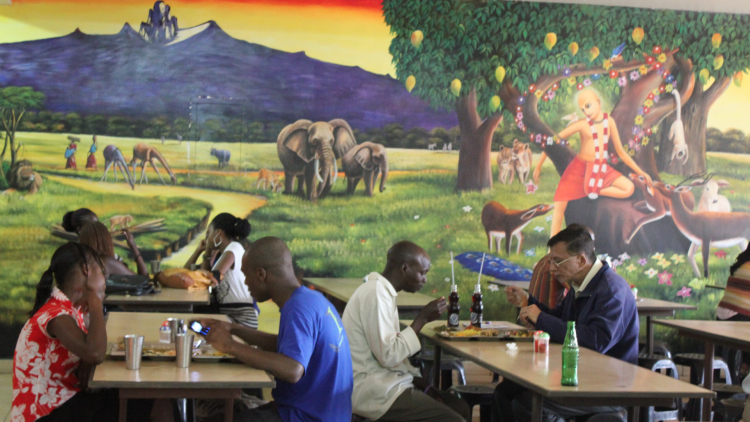Nairobi’s Jagannath Restaurant Makes Prasad Affordable
By Madhava Smullen | Июн 20, 2014

A restaurant in Nairobi is subsidizing its sanctified vegetarian food, or prasadam, so that it’s affordable for low-income workers, while at the same time developing an ambitious plan for large-scale free prasadam distribution.
Located on the ground floor of the Golok Dham building at ISKCON Nairobi, the Jagannath restaurant projects a warm and welcome vibe even before you enter, with the wide-eyed Deity of its name smiling broadly from a colorful sign.
Inside, paintings of peacocks and Masai tribesmen adorn orange and black walls. And against the back of the restaurant, behind the buffet of steaming hot vegetarian dishes, is a giant painting of Sri Chaitanya Mahaprabhu. The Lord is depicted dancing with deers, tigers and elephants alike in the Jharikanda forest, projecting the restaurant’s theme of non-violence.
Manager Vishakha Jani explains that chanting Harinam and distributing Prasad is the chosen method of ISKCON’s outreach in Africa, where the sometimes dire poverty can make relating to philosophy difficult.
“The restaurant has its roots back in 1995, when my father Rajan Jani wanted to take Food For Life onto a bigger scale,” she says. “We raised money through cycling fundraisers, and began feeding poverty-stricken children on the streets and in schools and orphanages. Today, we serve 2,200 free meals a day in slum areas in Nairobi and in Arusha and Tanzania.”
In 2007, Vishakha’s father began developing a plan to expand his program to not only the poverty-stricken but also to low income earners.
In 2010, “Jagannath” opened its doors. The restaurant delivers about 250 lunch tiffins of rice, dahl, two subjis and chapatis to members of the Indian community working in industries throughout Nairobi, and uses the income to subsidize meals for local low income earners.
Jagannath is open from 11am to 4:30pm, and around 350 office workers, security guards and students from the local Ngara area come for lunch daily, snapping up a substantial meal for only eighty shillings – just under one US dollar.
What’s more, for them the food is not unfamiliar Indian fare but local cuisine. These include chapo, a kind of large round bread like a chapatti, which is served with rice, a lentil or bean stew, or potato and cabbage.
There’s also ugali, a dish of maize flour cooked with water to a dough-like consistency. Diners break off a lump of it, roll it into a ball with their right hand, and eat it with sukuma wiki, a kind of braised kale with tomato and spices.
All the food served at the restaurant is offered to the Deities of Lord Jagannath, Baladeva and Subhadra who preside over ISKCON Nairobi’s Rathayatra festival. The Deities reside in the aptly-named restaurant, and are worshipped with aratis and seven to ten food offerings daily.
Customers who eat at “Jagannath” often ask why the restaurant is vegetarian, and ask questions about the philosophy behind it. Some purchase small books by Srila Prabhupada that are available at the restaurant for a subsidized price of 20 shillings each, or about 23 cents.
Meanwhile “Jagannath” is becoming a brand with several other businesses being established to raise money for free food distribution on a large scale. There’s Jagannath’s Juice Bar at the Thika Road Mall in Nairobi, and a 300-acre Jagannath Growers farm in Embu where produce is grown for use in the restaurant and the excess is sold commercially.
With the funds raised from these efforts, Vishakha hopes to expand the Nairobi Food for Life and hold kirtan programs with free vegetarian feasts at a different school every month.
“We’re trying to use the profits we make to expand the prasadam distribution network in Nairobi and reach out to more and more people,” she says. “But we want to do it in a sustainable manner, rather than one just based on donations.”
Vishakha and her father also want to make sure their efforts retain purity and do not become too commercial, however.
“My father’s ultimate vision for Jagannath is to use the income from the restaurants and farms to donate to different ISKCON outreach activities in Africa,” she says.















